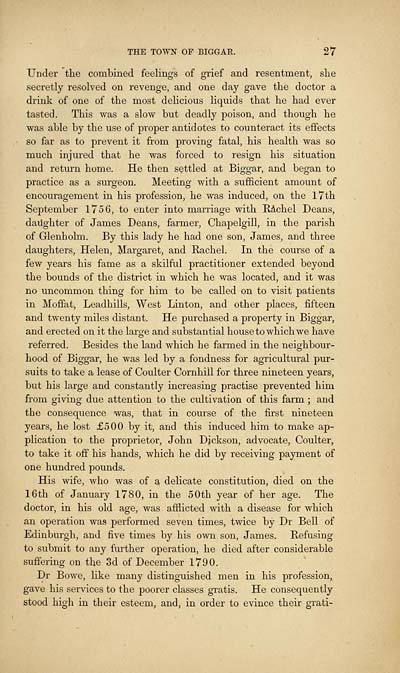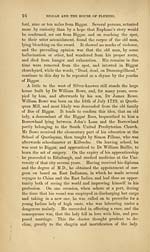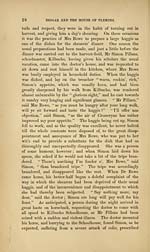Biggar and the House of Fleming
(47) Page 29
Download files
Complete book:
Individual page:
Thumbnail gallery: Grid view | List view

THE TOWN OF BIGGAR. 27
Under the combined feelings of grief and resentment, she
secretly resolved on revenge, and one day gave the doctor a
drink of one of the most delicious liquids that he had ever
tasted. This was a slow but deadly poison, and though he
was able by the use of proper antidotes to counteract its effects
so far as to prevent it from proving fatal, his health was so
much injured that he was forced to resign his situation
and return home. He then settled at Biggar, and began to
practice as a surgeon. Meeting with a sufficient amount of
encouragement in his profession, he was induced, on the 17th
September 1756, to enter into marriage with Rachel Deans,
daughter of James Deans, farmer, Chapelgill, in the parish
of Glenholm. By this lady he had one son, James, and three
daughters, Helen, Margaret, and Rachel. In the course of a
few years his fame as a skilful practitioner extended beyond
the bounds of the district in wbich he was located, and it was
no uncommon thing for him to be called on to visit patients
in Moffat, Leadhills, West Linton, and other places, fifteen
and twenty miles distant. He purchased a property in Biggar,
and erected on it the large and substantial house to which we have
referred. Besides the land which he farmed in the neighbour-
hood of Biggar, he was led by a fondness for agricultural pur-
suits to take a lease of Coulter Cornhiil for three nineteen years,
but his large and constantly increasing practise prevented him
from giving due attention to the cultivation of this farm ; and
the consequence was, that in course of the first nineteen
years, he lost £500 by it, and this induced him to make ap-
plication to the proprietor, John Dickson, advocate, Coulter,
to take it off his hands, which he did by receiving payment of
one hundred pounds.
His wife, who was of a delicate constitution, died on the
16th of January 1780, in the 50th year of her age. The
doctor, in his old age, was afflicted with a disease for which
an operation was performed seven times, twice by Dr Bell of
Edinburgh, and five times by his own son, James. Refusing
to submit to any further operation, he died after considerable
suffering on the 3d of December 1790.
Dr Bowe, like many distinguished men in his profession,
gave his services to the poorer classes gratis. He consequently
stood high in their esteem, and, in order to evince their grati-
Under the combined feelings of grief and resentment, she
secretly resolved on revenge, and one day gave the doctor a
drink of one of the most delicious liquids that he had ever
tasted. This was a slow but deadly poison, and though he
was able by the use of proper antidotes to counteract its effects
so far as to prevent it from proving fatal, his health was so
much injured that he was forced to resign his situation
and return home. He then settled at Biggar, and began to
practice as a surgeon. Meeting with a sufficient amount of
encouragement in his profession, he was induced, on the 17th
September 1756, to enter into marriage with Rachel Deans,
daughter of James Deans, farmer, Chapelgill, in the parish
of Glenholm. By this lady he had one son, James, and three
daughters, Helen, Margaret, and Rachel. In the course of a
few years his fame as a skilful practitioner extended beyond
the bounds of the district in wbich he was located, and it was
no uncommon thing for him to be called on to visit patients
in Moffat, Leadhills, West Linton, and other places, fifteen
and twenty miles distant. He purchased a property in Biggar,
and erected on it the large and substantial house to which we have
referred. Besides the land which he farmed in the neighbour-
hood of Biggar, he was led by a fondness for agricultural pur-
suits to take a lease of Coulter Cornhiil for three nineteen years,
but his large and constantly increasing practise prevented him
from giving due attention to the cultivation of this farm ; and
the consequence was, that in course of the first nineteen
years, he lost £500 by it, and this induced him to make ap-
plication to the proprietor, John Dickson, advocate, Coulter,
to take it off his hands, which he did by receiving payment of
one hundred pounds.
His wife, who was of a delicate constitution, died on the
16th of January 1780, in the 50th year of her age. The
doctor, in his old age, was afflicted with a disease for which
an operation was performed seven times, twice by Dr Bell of
Edinburgh, and five times by his own son, James. Refusing
to submit to any further operation, he died after considerable
suffering on the 3d of December 1790.
Dr Bowe, like many distinguished men in his profession,
gave his services to the poorer classes gratis. He consequently
stood high in their esteem, and, in order to evince their grati-
Set display mode to:
![]() Universal Viewer |
Universal Viewer | ![]() Mirador |
Large image | Transcription
Mirador |
Large image | Transcription
Images and transcriptions on this page, including medium image downloads, may be used under the Creative Commons Attribution 4.0 International Licence unless otherwise stated. ![]()
| Histories of Scottish families > Biggar and the House of Fleming > (47) Page 29 |
|---|
| Permanent URL | https://digital.nls.uk/94839846 |
|---|
| Description | A selection of almost 400 printed items relating to the history of Scottish families, mostly dating from the 19th and early 20th centuries. Includes memoirs, genealogies and clan histories, with a few produced by emigrant families. The earliest family history goes back to AD 916. |
|---|

